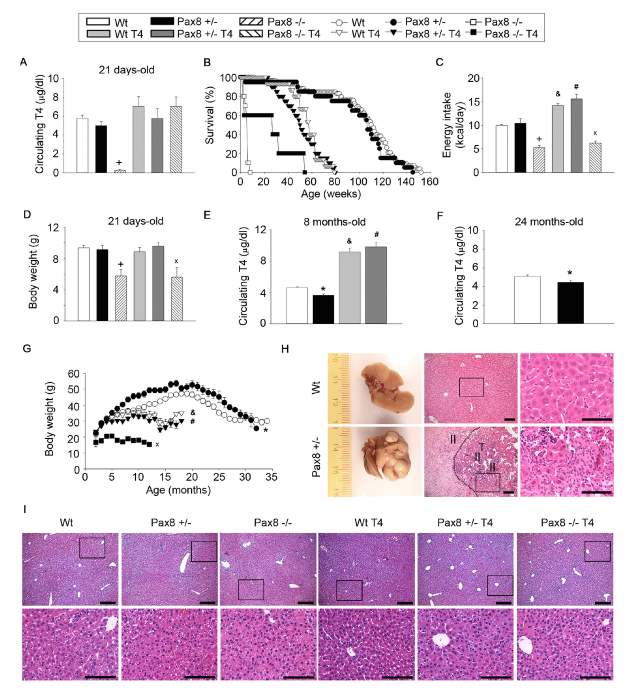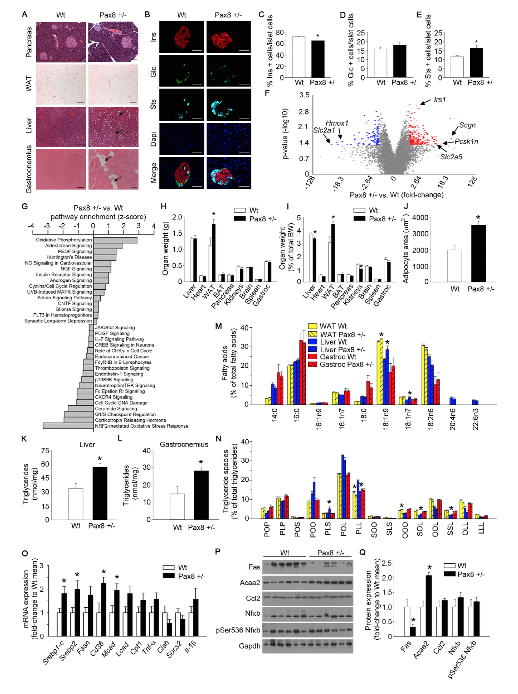Dr. Benoit Gauthier and Dr. Alejandro Martin-Montalvo discuss their 2019 research paper published by Aging (Aging-US), “Inadequate control of thyroid hormones sensitizes to hepatocarcinogenesis and unhealthy aging.”
Behind the Study is a series of transcribed videos from researchers elaborating on their recent studies published by Aging (Aging-US). Visit the Aging (Aging-US) YouTube channel for more insights from outstanding authors.
—
Dr. Benoit Gauthier
Good morning. My name is Benoit Gauthier. I’m a research scientist for the Regional Ministry of Health Andalusia in Spain. I work in the research institute called CABIMER, which is the Andalusian Center for Molecular Biology and Regenerative Medicine. I have a group here doing research on diabetes and autoimmune diseases. And when Alej (Dr. Alejandro Martin-Montalvo) initially joined my group, we were also interested in aging. So I will let Alej discuss this particular project, which was quite exciting, as this was a new field for my research group.
Hello, my name is Alejandro Martin-Montalvo. I’m also a researcher at CABIMER working for the Foundation of Health and Development on the Andalusian government. And yes, we have performed this project, which is a focus on to evaluate the role of thyroid hormones in healthspan and lifespan, and having a deep view, I guess, on metabolism. So we came to this project because there was a gene, Pax8, that was known to be expressed under certain metabolic circumstances in pancreatic islets. We first initially investigated was what can Pax8 be doing in pancreatic islets? And we developed several lines of research within this topic, showing that Pax8 is expressed during pregnancy in pancreatic islets, and it’s actually doing something. We believe that we have demonstrated that Pax8 protects the islets under these challenging conditions. As you know, pregnancy is a challenging because in addition for the pregnant mother, and this is part of what we have done.
So another thing that Pax8 is doing is controlling the production of thyroid hormones. So since thyroid hormones are also very important for metabolism and for health, we also thought that besides the role of Pax8 in pancreatic islets, it could be also doing via thyroid function effects. So, and this is why we came into this project where we evaluated, whether changes in thyroid hormone levels could have a physiological relevances for healthspan and lifespan. And in order to do this project, what we did is to use the Pax8 on (inaudible) mice, Pax8 on (inaudible) mice, and what the mice treated or not with thyroid hormones. The aim of this project was to have a physiological condition of hypothyroidism, severe and mild, and then normal thyroid function, no thyroidism. We evaluated the healthspan, the lifespan and the metabolic health. So what we first did is first initiate longevity, and this actually, we normally start with these projects with the longest experiment that we can do in the lab.

We did a three-year experiment where we have the animals healthy, safe, in a cage, and we let them live as much as they can, and we monitor the health of these animals. And what we obtain is that severe hypothyroidism is almost lethal. Animals last two, three weeks, then hyperthyroidism, where we treat animals with thyroid hormones, they have twofold increase in thyroid hormones. They die around 50% of the normal lifespan of a mouse. Then we also evaluated a mild production of thyroid hormones. We’re talking here about 10% production of thyroid hormones. What we didn’t observe is that these animals have a more or less normal lifespan, slightly shorter, but not statistically significant, but they develop metabolic liver relations. So these animals are obese. And these animals, when they die, they’re prone to have liver cancers. Actually, approximately 50% of the animals died from or had a liver cancer in the necropsies.
And this was actually one of the most surprising things that we saw that the just 10% reduction of thyroid hormones can lead to threefold increase on liver cancers. So we evaluated what was happening in the liver and many other features. We also evaluated the skeletal muscle, the white adipose tissue, and even the pancreatic islets. And what we observed is that the liver, mitochondria in the liver are dysfunctional. They have problems. They generate not in terms of production of energy, where we didn’t detect any major effect, but they were prone to generate superoxide. As you know, superoxide is a oxygen directed species and it drives to accumulate gross damage. And that could be potentially contributing to these carcinogenic events that we observe. That was for me, one of the most striking or unexpected findings. So first, Benoit, I don’t know if you want to say something at this stage.
Dr. Benoit Gauthier
I think you summarized it quite well. What is interesting is one of these projects that Alej developed in the lab because I was interested in Pax8 and islet, but then he came from the NIH on aging and he said, “Benoit, let me, let’s try to do an aging with the thyroid.” And for me, that was quite interesting because it led up to a new field that he’s now pursuing by himself. For me, the most striking was that indeed, in human low levels of thyroids that have been linked to longevity. The longest lived Japanese have long lived life, low levels of thyroid hormone. And yet what we find, what Alej finds, is that when you have low levels or mildly low levels of thyroid because of the Pax8 mutation, you are metabolically, let’s say, impaired, and you have a greater chance of developing liver cancer, which is quite amazing. So this combined with the fact that we also previously, or Alej published another paper in diabetes, showing that indeed, in human mutations, in this backstage gene causes gestational diabetes.
So in fact, this has become a major target, which we’re actually very interested to pursuing because Pax8 not only causes in female gestational like cancer, liver cancer. So it’s quite a hot topic and quite interesting. So this is what I had to add to what Alej said.
Dr. Alejandro Martin-Montalvo
So actually, yes, I believe that everybody in the knows that from the last century that thyroid hormones have played major role in health and even in longevity, but we are now trying to understand what they are actually controlling. And for example, we have developed some techniques or some experiments showing that it has different effects on actually every single tissue controlling metabolism. For example, in pancreatic islets, we saw that they are rearranging the metabolism of pancreatic islets. And we have, for example, increases in the production and secretion of insulin and actually the antioxidant defenses of pancreatic islets, which is quite limited, per se. It’s even lower when you have the regulation of thyroid hormones. And that was also another finding that was unexpected and that we want even to continue studying, because there were certain fields that we saw that we still don’t understand and they’re quite surprising.

For example, the population of somatostatin cells is increased under mild hypothyroidism and we still don’t know what’s happening. We have to pursue this, and it’s very interesting. So yes, we have developed research in different in metabolic tissues and we believe that we should still investigate because there are many things that we still don’t understand. It’s quite interesting to have a global idea of thyroid function.
Dr. Benoit Gauthier
So just to add on to that, Alej, it’s true that for example, we still don’t know many things. One of them is, for example, in deliver, when you did the proteomic lipoic approach, this is also something quite interesting because Alej took multi-omic approach. We did transcriptomic, so looking at the genome level, at the transcriptome transcript level, he looked at the proteomic level and he looked at lipodomic level, looking at lipids. And what he found basically is that in the liver, there’s actually an increase in oleic acid and historically oleic acid has always been linked to as a good lipid. And what we see is that in fact, it’s increased in our animal model of hypothyroidism, and there are reports, in fact, linking oleic acid to liver cancer, but it’s only association. There has been no relink.
So this is also a bomb because now what we’re saying is that, well, in fact, oleic acid is not good. It may actually be bad in that the ratio between palmitic and oleic acid and liver may be detrimental. So this is also another area that has opened Pandora’s box, if you want, because we’re going against the wave that oleic acid is the good guy.
Well, I think it’s important that to say that this work was supported by the Ministry of Economy and Science and more particularly the Institute Carlos III, which is the health branch of this ministry who actually provided not only the funding for the research, but also the funding salary for Alej, which has been great because I think Alej, you can do it for me, but coming back from the NIH, also the Andalusian government. Maybe you can describe a bit of that? Okay, Alej?
Dr. Alejandro Martin-Montalvo
Yes, we should acknowledge that Health Ministry of the ‘Fundación Progreso y Salud’ of the Andalusian Regional Ministry of Health has supported this research. And also the government of Spain through the Instituto de Salud Carlos III, which is the NIH of Spain and also the Foundation of the Spanish Society of Diabetes through the pilot group has supported this research. Everybody has contributed here and this is great that they have the support and also the support of the research center, CABIMER, to be able to have to perform this here in Andalusia and in Sevilla.
Click here to read the full study published by Aging (Aging-US).
AGING (AGING-US) VIDEOS: YouTube | LabTube | Aging-US.com
—
Aging (Aging-US) is an open-access journal that publishes research papers monthly in all fields of aging research and other topics. These papers are available to read at no cost to readers on Aging-us.com. Open-access journals offer information that has the potential to benefit our societies from the inside out and may be shared with friends, neighbors, colleagues, and other researchers, far and wide.
For media inquiries, please contact [email protected].
